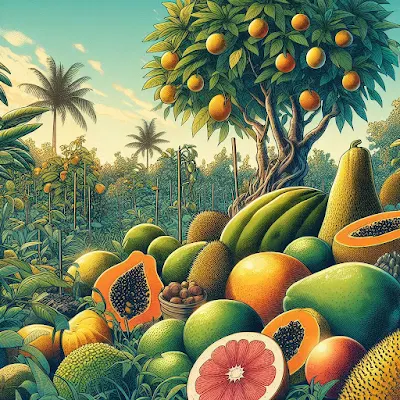Survival Garden Fruit Tree Ideas: Diversifying Your Orchard with Avocado, Papaya, Mango, Jackfruit, Soursop, and More

Creating a resilient and productive survival garden involves selecting a diverse array of fruit trees that can thrive in various climates and provide a continuous supply of fresh, nutrient-rich produce.
Incorporating tropical and subtropical fruit trees such as avocado, papaya, mango, jackfruit, soursop, and others can enhance the diversity, sustainability, and self-sufficiency of your garden. Here are some ideas for incorporating these exotic fruit trees into your survival garden:
1. Avocado (Persea americana):
- Avocado trees are prized for their creamy, nutrient-dense fruits rich in healthy fats, vitamins, and minerals. They thrive in warm, subtropical climates with well-drained soil and ample sunlight. Consider planting varieties such as 'Hass', 'Fuerte', or 'Reed', which produce abundant yields of delicious avocados ideal for fresh eating, salads, sandwiches, and guacamole.
2. Papaya (Carica papaya):
- Papaya trees are fast-growing, tropical fruit trees that produce large, elongated fruits with sweet, juicy flesh and edible seeds. They prefer warm temperatures, full sun, and well-drained soil. Look for dwarf or semi-dwarf papaya varieties suitable for container gardening or small spaces, such as 'Solo', 'Red Lady', or 'Maradol', which offer reliable fruit production and ornamental value.
3. Mango (Mangifera indica):
- Mango trees are renowned for their deliciously sweet and juicy fruits, which come in a variety of sizes, shapes, and flavors. They thrive in tropical and subtropical climates with hot summers, well-drained soil, and ample sunlight. Choose mango varieties suited to your region, such as 'Kent', 'Tommy Atkins', or 'Ataulfo', known for their excellent flavor, disease resistance, and consistent fruiting.
4. Jackfruit (Artocarpus heterophyllus):
- Jackfruit trees produce large, tropical fruits with sweet, flavorful flesh and edible seeds, often compared to a combination of banana, pineapple, and mango. They grow best in warm, humid climates with deep, fertile soil and regular watering. Consider planting dwarf or grafted jackfruit varieties, such as 'Golden Nugget', 'Black Gold', or 'Ceylon', which yield compact trees suitable for smaller gardens and containers.
5. Soursop (Annona muricata):
- Soursop trees bear exotic fruits with soft, prickly green skin and creamy, tangy-sweet pulp rich in vitamins, minerals, and antioxidants. They thrive in tropical climates with high humidity, well-drained soil, and protection from strong winds. Look for soursop varieties known for their exceptional flavor and disease resistance, such as 'Morada', 'Giant Mexican', or 'Vietnamese', which produce large, flavorful fruits ideal for fresh consumption or juicing.
6. Guava (Psidium guajava):
- Guava trees are small to medium-sized fruit trees that produce aromatic fruits with sweet, tropical flavors and edible seeds. They are well-suited to subtropical and tropical climates with mild winters, well-drained soil, and ample sunlight. Consider planting guava varieties such as 'Ruby Supreme', 'White Indian', or 'Pink Indonesian', which offer a continuous harvest of flavorful fruits for fresh eating, jams, jellies, and desserts.
7. Citrus Trees (Citrus spp.):
- Citrus trees, including oranges, lemons, limes, and grapefruits, are versatile and productive fruit trees that thrive in a wide range of climates. They prefer sunny locations with well-drained soil and regular watering. Choose citrus varieties adapted to your climate and growing conditions, such as 'Valencia' oranges, 'Eureka' lemons, 'Key' limes, or 'Ruby Red' grapefruits, which offer delicious fruits for juicing, cooking, and fresh consumption.
By incorporating a diverse selection of fruit trees like avocado, papaya, mango, jackfruit, soursop, guava, and citrus into your survival garden plans, you can create a resilient and productive orchard that provides a continuous supply of fresh, nutrient-rich fruits for you and your family.
Whether grown in the ground, containers, or espaliers, these exotic fruit trees offer a wealth of culinary possibilities, nutritional benefits, and ornamental value, enhancing the sustainability and self-sufficiency of your garden ecosystem.













